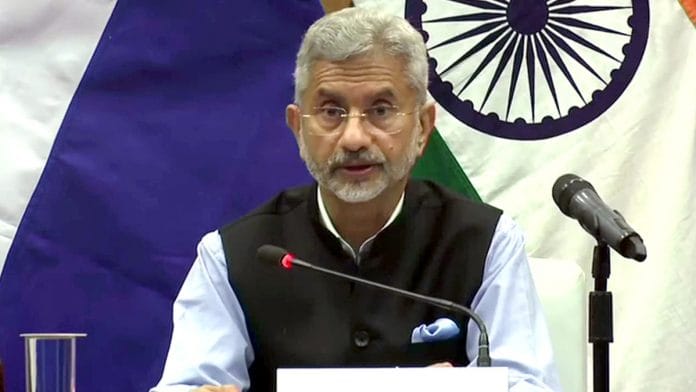New Delhi: The Quad, or the Quadrilateral Security Dialogue, is not an “Asian NATO” and India never had a “NATO mentality”, External Affairs Minister S. Jaishankar said Tuesday even as he stressed that in the changing global order, like-minded countries are coming together to form coalitions.
The minister made the comments at the Raisina Dialogue, where he spoke along with Jean-Yves Le Drian, Minister for Europe and Foreign Affairs of France, and Marise Payne, Minister for Foreign Affairs of Australia.
Jaishankar said the Indo-Pacific strategic construct is not about reinforcing the Cold War era but to “overcome” it.
“The idea that when we come together and there is some sort of a threat or messaging to others, I think people need to get over this… This kind of using words like ‘Asian NATO’ etc is a mind-game which people are playing,” Jaishankar said.
“I can’t have other people have a veto about what am going to discuss, with whom I’m going to discuss, how much I’m going to contribute to the world. That’s my national choice. That kind of NATO mentality has never been India’s. If it has been there in Asia before I think it’s in other countries and regions, not in mine,” he added.
After the Quad got revived in 2017, and now since the first-ever summit of the Quad countries — India, Japan, Australia and the US — many commentators have referred to the Quad as the ‘Asian NATO’.
However, denying that the Quad is a security alliance, or an “Asian NATO”, Jaishankar said the grouping has dealt with 10 broad subjects so far — vaccine collaboration, higher education and student mobility, climate action, HADR (high availability disease recovery), emerging technology, resilient supply chains, semiconductors, disinformation, counterterrorism and maritime security.
“That list will tell you what is in our minds and what is the purpose of what we are trying to do… So the purpose of coming together is actually to find ways of working for our national benefit, for our regional benefit and for global benefit,” he said.
Also read: India, EU ‘intensely preparing’ for joint summit in May: EU Council chief Charles Michel
‘Indo-Pacific not about reinforcing Cold War’
In an effort to reiterate India’s focus on the Indo-Pacific strategic construct, Jaishankar said, “Indo-Pacific is a return to history. It reflects a more contemporary world. It is actually overcoming the Cold War, not reinforcing it.”
As the world is changing, India is now also forming coalitions with other like-minded countries with which it can “work together” and it is so because multilateralism “is not delivering the way it used to”, he said.
“There’s a vacuum which has emerged where multilateral has fallen short. Powers are not what they used to be, bilateral delivery is not what it used to be, so it requires countries which are comfortable with each other, who see merit in working with each other and who will make the world a better place by working together, come together,” he said.
“So, the world is moving towards groups of countries who are looking to work together… Pick your region, pick your combination, but I think that’s where the world is moving,” he added.
Historically, India used to see Indo-Pacific as Indian Ocean and Asia-Pacific. But today, due to globalisation, rebalancing of power and multipolarity “coming together” of countries have taken place, he said.
‘Willingness to work together’
Speaking at the event, French FM Le Drian said, “We share the same willingness to work together simply because we get along well and not just because we share some common interests or concerns, but because we are democracies and because we comply with the rule of law. On top of it we want to do it together.”
The French FM also added that the security in the Indo-Pacific region is very important.
According to Payne, Australia has a practical approach towards Indo-Pacific, and the Covid pandemic has made stronger democracies come together.
India, France and Australia are planning to launch a trilateral dialogue soon.
Also read: India-China ties set for ‘hard times’ over next 5-10 years, ex-NSA Shivshankar Menon says







HADR is Human Assistance and Disaster Relief
The so called Quad is supposed to be equally ranked partnership. Domestic economic conditions and the major covid problem are keeping the natural ranking of power underneath for now. Talk all you want and thump your chest as many times as you like. A time will come, hopefully not near term, when the vigorous “SHUT UP” will come out of USA. Just a matter of time. Loose talk will not help.
well USA is itself not in a position anytime soon to ‘SHUT UP’ its allies. And if it does India very well knows how to balance out superpowers, remember governments may have changed, but the core policy has not. So keep this bullshit knowledge to yourself only or go lick chinese boots.